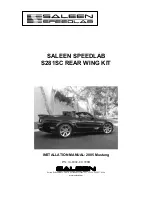
2000 Volvo S & V 40
· Stopping the engine suddenly after high speed driving (so-called "after-boiling" can occur).
· To avoid overheating, the following rules should be followed:
Do not drive for prolonged periods at engine speeds above 4500 rpm if you are towing a trailer in hilly
terrain.
Reduce speed and downshift when towing a trailer up long, steep inclines. The risk of overheating can
be reduced by switching off the air conditioning system for a short time.
Do not let the engine idle unnecessarily for prolonged periods.
Do not mount auxiliary lamps in front of the grill.
When the risk of overheating is imminent, or in the event of overheating (the temperature gauge goes
repeatedly into, or stays continually in, the red section), the following precautions should be taken:
· Switch off the air conditioning system.
· Pull off the road, away from traffic, stop the car and put the gear lever into neutral. Do not stop the
engine!
· Switch the heater to full (maximum) position. Increase the engine speed to approx. 2000 rpm (twice
idling speed) until the temperature begins to drop.
WARNING!
Do not remove coolant expansion tank cap. The coolant will be extremely hot.
See "Coolant" to check and top-up the coolant level if necessary.
CAUTION: Drive slowly and carefully if going through standing water (i.e. flooded roadways, etc.).
Damage to engine could result if excess water is ingested through the air intake system.
Never drive the vehicle in water deeper than 1 foot (300 mm). See flood warning on
page 8
.
file:///K|/ownersdocs/2000/2000_SV40/00sv40_04b.htm (2 of 9)12/30/2006 3:42:39 PM
















































